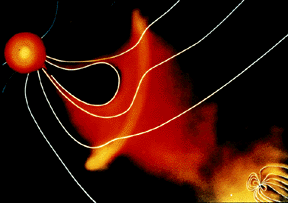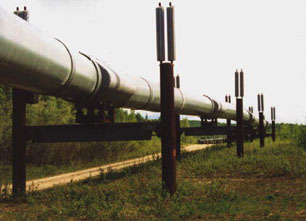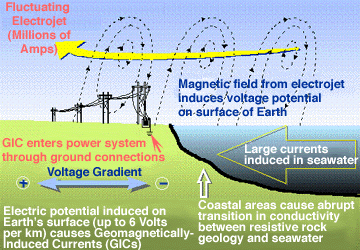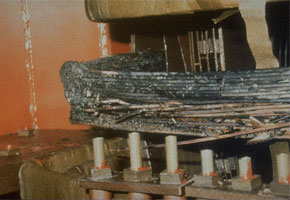Homing pigeons are apparently able to sense magnetic fields and use an internal compass to help them navigate. When space weather disturbances disrupt Earth's magnetic field, these pigeons can become confused and lose their way.
Click on image for full size
Image courtesy of M.A. Shea, Geophysics Directorate, Phillips Laboratory.
Confused Homing Pigeons and Space Weather
Certain animal species on Earth (such as the homing pigeon) are able to detect Earth's magnetic field and use it for navigational purposes. Homing pigeons have been known to reach home by flying over 1,600 km (1,000 miles) in two days time through unfamiliar territory. In homing pigeons, this ability has been cultivated by selective breeding. Homing pigeons were used by the U.S. military during World War I, World War II and the Korean War. During World War I, one amazing bird flew 25 miles in 24 minutes to deliver a message, arriving with one leg shot off and a bullet wound. Pigeons were replaced in the military by electronic devices in 1956. However, racing homing pigeons is a sport that is enjoyed worldwide.
During space weather disturbances, the intense electric currents flowing in near-Earth space produce nonsteady magnetic fields that are felt at the Earth's surface. Homing pigeons have been observed to become confused during such disturbances and can even be lost.
You might also be interested in:

There is a giant magnetic "bubble" in space around the Sun. That "bubble" is called the heliosphere. In a sense, we Earthlings live within the outer atmosphere of our Sun. The solar
...more
Earth's magnetosphere shields our planet from most of the solar wind. Some solar wind particles do leak in and combine with ions escaping from the top of Earth's atmosphere to populate the magnetosphere
...more
Pipelines for transporting oil, natural gas, and water are often made of conducting materials like steel. Very long pipelines (thousands of kilometers/miles) are used to transport oil and gas at high latitudes,
...more
The invention of the seamless, electrically-welded pipe in the 1920's which was capable of carrying material under high pressures, enabled the building of profitable pipelines over a thousand miles long.
...more
Certain animal species on Earth (such as the homing pigeon) are able to detect Earth's magnetic field and use it for navigational purposes. Homing pigeons have been known to reach home by flying over 1,6
...more
Space weather "storms" can cause problems on Earth. They can even mess up our systems that make electricity and that deliver electricity to peoples' houses. Sometimes really big space weather storms can
...more
Our electrical power system supplies our homes and businesses with electricity. Space weather storms can mess up the power system, leaving us without electricity. A transformer is a piece of equipment
...more













